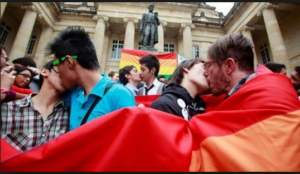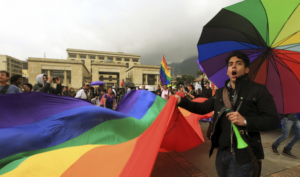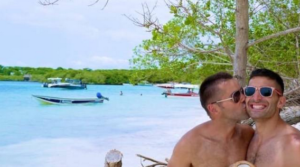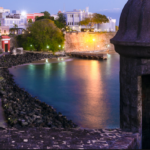July 11, 2016
Bogota is Colombia’s largest city with over eight million residents and is the nation’s capital. The city is known as “The Athens of South America” for its large number of universities and libraries. A poll offers increasing evidence that gay marriage is widely accepted in major cities across Latin America. (photo right: gay couples kiss after Court decision)
On April 17, 2015
Colombia made news in its search for social justice. The Constitutional court considered the same pension system presently in force is applicable to same-sex couples. With this decision, the court has continued down the road it started on last year, when it made man-woman couples that lived together the same as same-sex couples; and later with the affiliation of the same-sex partners into the national general health insurance system; and now again with the subject of pensions. This is a new high impact activist strategy in which organizations and activists have participated and proved victorious.
August 27, 2010
Sixty-Three Percent Of Bogota Residents Support Gay Marriage–A new poll finds a large percentage of residents of Bogota, Colombia favor gay marriage, Caracol Radio reported. The research firm Econometrics SA’s telephone survey of 200 thousand Bogota residents found that sixty-three percent agree that gay men and lesbians should be allowed to marry. The study is the most comprehensive on LGBT people ever conducted in the country.
January 29, 2009
Colombia’s Constitutional Court said Wednesday that gay and lesbian couples are entitled to equality. An April 2008 lawsuit supported by a number of human rights organizations sought to alleviate a series of inequalities in Colombia law. Colombia does not offer gay marriage or civil unions for gay couples, but in 2007 the same court extended several common-law marriage benefits to gay couples. Yesterday’s ruling goes farther, giving gay couples all the benefits and responsibilities enjoyed by heterosexual common-law couples.
February 20,2009
An Interview with Marcela Sánchez of Colombia Diversa
Marcela Sánchez (photo right) is the executive director of the gay and lesbian rights organisation Colombia Diversa. Following a landmark Constitutional Court ruling in favour of civil unions for same-sex couples, she spoke with the City Paper editor Andrew Dier. The interview appears in the February edition of The City Paper and is republished with permission.
City Paper: After the court ruling in January, where does Colombia stand in terms of gay and lesbian rights?
Marcela Sánchez: In terms of same-sex partner rights, Colombia is at the forefront of rights in Latin America. The first country to achieve that in the region was Uruguay, but what we have now in Colombia puts us in first place because of the number of rights we have. There are a handful of countries, of course, that offer same-sex marriage rights and adoption rights.
Has the fight for equality been won here?
Not at all. There are still prejudices among public officials who are reluctant to fulfil their obligations when same-sex couples go to them to take advantage of their rights. Discrimination against LGBT people as individuals still exists, particularly in the workplace, schools and in the social arena.
How was your coming out?
I’m from the department of Caldas, but came out of the closet when I was 20 in Bogotá when I was at the university. That was when I had my first relationship with a woman. With my friends, fellow students and even supervisors it wasn’t a big deal. With my family, it was a slower and progressive process.
What was your first taste of activism?
I was first involved in the feminist movement here, then worked in the health sector to incorporate recognition of rights in that field.
How did Colombia Diversa begin?
It began with a group of activists and academics who had worked together to promote legislation in Congress about same-sex partner rights. When they archived the bill in 2003, we saw the need to set up a permanent and strategic organization.
In only five years since its founding, Colombia Diversa has accomplished a lot. Are you surprised by your success?
Yes and no. It doesn’t surprise me because the Constitution is very progressive and states that diversity should be respected. I’m not surprised either, because we have done a lot of serious work, with the participation of so many individuals and organizations. With so many allies, that shows that this is an issue that is in the public interest.
In what ways do you consider Bogotá to be an accepting city for LGBT people?
In many ways. The mayor’s office has a public policy for the LGBT population, there is an LGBT community centre in Chapinero operating for two years now, there is a huge offer of gay bars and other places of interest, and we have quite a bit of visibility in the media here.
What is the community centre about?
It’s a place where LGBT people can feel comfortable, where they offer psychological and legal counselling and hold cultural events.
What is still lacking here?
We need to make our legal triumphs into a reality and we need for smaller towns and regions to make advances like the community has achieved in big cities like in Bogotá.
What are some of the major events here on the gay calendar?
Our gay pride march on the first weekend of July and the Ciclo Rosa LGBT film festival is usually held in September.
Do you think that Bogotá could become an international gay tourist destination?
I think so. There is a lot of potential there. But we need for the city government to begin to promote it.
Where are some good places for women to hang out?
Mmm… I don’t really go out that much. But I think it is important to support the few night spots for women here.
In the gay world here in Colombia, is it still predominantly dominated by men?
Well, at least they are more visible. But I think that, at least in the activism world, the role of lesbians and transgendered people is growing.
What do your family and friends think of your activist life?
They are very happy. They like that I am part of a group that is changing the history of this country. They are happy that I am their cousin, sister, daughter, niece.
How do you explain that in Colombia, with so many problems regarding terrorism, kidnapping and the armed conflict, the country at the same time is extremely advanced in terms of same-sex couple rights?
Colombia is a country of many contrasts, those problems have very different origins and causes and really can’t be compared.
What are some other causes dear to you?
Women’s equality and a Colombia free of war
So far, in the gay rights movement, activists have focused on changes in the law. But are there certain things that you think LGBT people should be doing themselves in order to improve their situation?
Foremost, we have the responsibility to take advantage of our rights that we have won. We should make sure that government officials fulfil their responsibilities and we should support new initiatives in other cities and countries and support other human rights organizations.
Although there have been so many gays and lesbians in public life here before, why do you think it is so hard for them to come out publicly?
Because despite the legal advances and even though discrimination is illegal, many people continue to place limits on the rights of others because of their sexual orientation. Many can’t speak of their sexual orientation when they talk about their lives.
Do you think Colombia is ready for an openly gay or lesbian member of Congress?
Yes, but only if their campaign isn’t based on their sexual orientation.
What would be your message to those who believe that homosexuality is a sin?
It is worth mentioning that there are many churches here in Colombia quite inclusive of gay people, and the Catholic Church has condemned discrimination against gay people. But for those who think being gay is a sin, this idea must never hold influence in government affairs and should never be imposed on the population.
(From: ukgaynews.org.uk)
———————–
Other LGBT Colombia websites:
http://www.ncbi.nlm.nih.gov/pubmed/3832796 (academic study)
http://ipsnews.net/news.asp?idnews=44953 (dangerous homophobia)
http://www.powerofculture.nl/en/current/2005/august/bogota.html (Gay Pride Bogota)
http://colombiareports.com/colombia-news/interviews/9070-homosexuality-catholicism-and-three-way-love-living-an-alternative-lifestyle-in-colombia.html (a three-way couple)
http://www.guiagaycolombia.com/
http://www.misscolombiagaymedellin.com/
Overview of LGBT Scene in Colombia
Also see:
Gay Colombia News & Reports 2001 to Present
July 2016
















